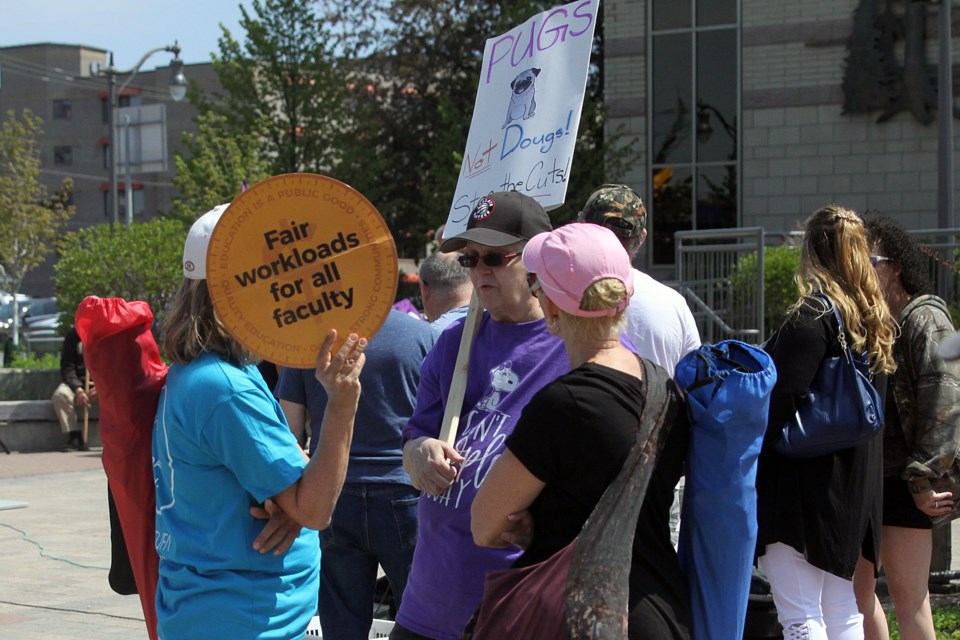THUNDER BAY – While Premier Doug Ford and his cabinet celebrated the first anniversary of their decisive election victory, local poverty reduction and labour advocates were in a less joyous mood as they marked one year of the Progressive Conservatives' reign in Ontario.
Cuts made by the Ford government prompted more than 50 demonstrations backed by the Ontario Federation of Labour across the province on Friday, including in Thunder Bay where a crowd gathered outside city hall.
Angie Lynch, one of the Thunder Bay organizers of the province-wide day of action, said many of the decisions made by the Ford government in the first year of its term will keep people living in abject poverty.
“Everything that they’re doing is targeting the most vulnerable. Right now, we’re in a position in this province where we’re seeing the results of the Harris cuts in the 90s. That’s why we have all of the shelters, soup kitchens and people homeless on the streets,” Lynch said.
“If we allow this to continue, in another five or 10 years, God only knows what we’re going to see in our community. It’s frightening to think about.”
One of the first decisions made last summer by the fledgling Ford government was to end the basic income pilot project which was launched in 2017 by their Liberals predecessors as a three-year trial. That program provided guaranteed income supplements to 4,000 people in Thunder Bay, Hamilton, Brantford and Lindsay. The final payments were received at the end of March.
Joshua Hewitt, who was a local basic income recipient, said the program’s cancellation has had a tremendous impact on his life.
“I’m working part-time so I’m kind of struggling to make ends meet. I’ve recently returned to the Ontario Works social assistance program,” Hewitt said.
“They are exempting my work income, but it’s still a struggle having a few hundred dollars less than what I was making before and having to file reports and jump through all the hoops and barriers without the necessary supports I need as an individual with a disability. It’s quite challenging and I imagine the road ahead is going to be quite challenging with the criteria of disability changing.”
People are not adjusting well, Lynch said.
“It’s hard to go through such a huge cut in income,” she said. “There’s a lot of anxiety. There’s a lot of people that really afraid. The nutritious food they had access to before is basically gone. Some people are having to move into cheaper accommodations because they can’t afford their rent. Some people weren’t able to finish their school programs.
“It’s really thrown people into a tailspin.”
As well, minimum wage was frozen with the nixing of the previously promised increase to $15 per hour that would have taken effect at the start of 2019, though the government has removed the provincial portion of income tax for low earners.
One of the government’s next targets appears to be employees on the province’s payroll.
The Ford government has signalled that it intends to play hardball during upcoming labour negotiations, tabling legislation that would public sector wage increases on new collective agreements at one per cent.
Ed Arvelin, an Ontario Public Service Employees Union executive board member and regional vice president, said it’s an issue that goes beyond just those who will be directly affected.
“Doug Ford is picking a fight with labour and not just unionized – all labour,” Arvelin said. “When you restrict one, you restrict all. Everybody in the province of Ontario should stand up, not just unionized. It affects everybody – families and people that are in un-unionized environments.”
